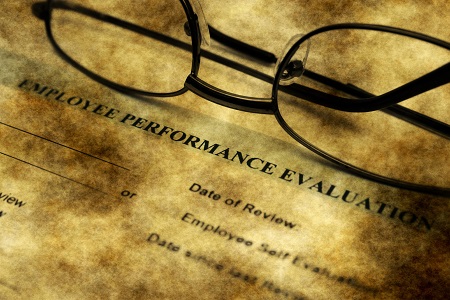Don’t Use KPIs in Employee Performance Appraisal
by Stacey Barr |Our organisational culture has so strongly tied KPIs to employee performance that, despite no proof it works and overwhelming proof that it doesn’t work, few are willing to stop using KPIs in performance appraisals.

Here, when I say KPI, I mean performance measures that monitor how well people are performing in their roles. In performance appraisals, these KPIs or measures are used by managers to help determine if a staff member is up to scratch, deserving of a reward (financial or non) or in need of being “performance managed” (or fired).
The problems with using KPIs or measures in performance appraisals are usually the same for the majority of organisations. It encourages people to:
- fudge the figures so no-one gets an accurate or objective view of true performance
- compete rather than collaborating with colleagues for fear of being the one to miss a personal target for the greater good
- suffer from too little feedback too late to prevent performance problems
- focus on doing tasks more productively even if they don’t produce meaningful results
- count easy widgets versus measuring meaningful results.
You’ve seen this happen, haven’t you?
Employee performance appraisals that use KPIs have ignored human nature.
At the root of those problems listed above, is human nature. Particularly our self-esteem, feeling valued and accepted by others, feeling a part of something bigger than ourselves, wanting to make a real difference in the world. But when we use measures to evaluate and judge each other’s performance, we push against these basic human needs.
Focusing KPIs on individual performance ignores systems thinking.
In systems thinking, we learn that the whole is more than the sum of the parts. If you total up the performance of all the people, you *don’t* get a value that equals the performance of the organisation. People aren’t the organisation’s performance, they create the organisation’s performance through their decisions and actions and, most importantly, their collaboration. When we measure individual’s performance, we encourage them to focus on themselves, not the whole.
When people have KPIs to hit, everyone ignores collaboration.
You don’t need to measure people against each other. You don’t need to know who is the best performer or the worst. You don’t need to worry about the very few poor performers. You’ll give organisational performance the biggest boost if you turn your attentions to giving everyone the best opportunities to work together to make a valuable difference. Everything else is subordinate to that.
The solution is not better KPIs for performance appraisals.
The whole idea of measuring people, in my humble opinion, is undignifying. It’s a form of judgement that evokes self-preservation in people rather than self-actualisation. What’s more, it fails to produce better organisational performance, because the problems I mentioned before actually erode organisational performance in a downward spiral.
So what can we do instead?
As the self-titled Performance Measure Specialist, you can guess I’m not suggesting that we don’t need KPIs or performance measures. It’s how we use them in relation to performance appraisal that needs to change.
Instead of choosing measures to judge how people have performed, come performance appraisal time, help people choose measures of the results they collaborate to produce, and to use those measures themselves as ongoing and regular feedback – between performance appraisals – to adjust and improve how those results are produced. Performance appraisals then become about how the organisation can help people self-actualise, to help them grow further into who they want to be.
And if I have failed to shift your opinions about using KPIs in performance appraisals, and you feel certain that it’s working well in your organisation, I implore you to take a closer look.
TAKE ACTION:
Is your performance appraisal system the elephant in the room, taking up a LOT of space, doing more damage than good, and is so obvious that it’s easy to ignore? Take a closer look and see if you can’t find a way for performance measures to be used more meaningfully in managing people’s performance – as tools to give them the best chance to perform well, not as a means to judge their performance.
Connect with Stacey
Haven’t found what you’re looking for? Want more information? Fill out the form below and I’ll get in touch with you as soon as possible.
167 Eagle Street,
Brisbane Qld 4000,
Australia
ACN: 129953635
Director: Stacey Barr




